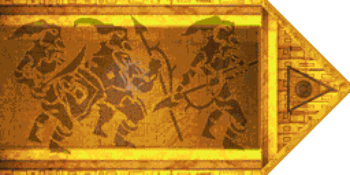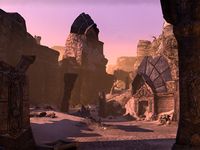
The Rourken were a clan and house of Dwemer that lived in the wastes of Hammerfell. The Rourken are most well known for their exodus from Morrowind, after the formation of First Council between the Chimer and the Dwemer. In legend, the Rourken Chieftain grasped his mighty warhammer, Volendrung and cast it to the far west, where he and his people would rebuild.[2] The hammer is seen as a family symbol for Clan Rourken.[3] Their capital city is known as Volenfell, which translates to the "City of the Hammer" in Dwemeris. It is located in the vast expanse of the Alik'r Desert, however accounts vary on its specific location, either in the Gilane region,[2] or in the mountains southeast of Satakalaam.[4]
HistoryEdit
When the First Council was founded in 1E 420, the Rourken Clan self-exiled from Resdayn because they did not want to make peace with the Chimer. The Rourken Chieftain lifted his hammer, Volendrung and threw it to the far west across Tamriel, promising to lead his clan to "wherever it should fall". Their trek through the continent has been the subject of legend, often depicted in Hammerfell dwemer ruins as a mass exodus of golden-clad dwemer and trudging through the forests of Cyrodiil. Once they reached the desert, Volendrung landed head-strong from the clouds like a falling star in the night sky before it landed.[5] The Rourken Clan initially settled throughout the province's southern coast, where they established an easy trading agreement with the Aldmer to the south, and the Bretons to the north. Near the Gilane region, they built their capital city, Volenfell, on the site where his hammer fell.[2]
The Rourken discovered that the land was rich in resources and untapped potential was within their grasp, so they expanded beyond their capital and built many deep mines and busy workshops.[6] The Rourken had expanded all over the Alik'r Desert and beyond, as far south as Bthzark in Stros M'Kai,[7] and some that stayed east in the Dragontail Mountains like the colony, Rkundzelft.[8] The Dwemer scholar, Thelwe Ghelein believed that other clans splintered themselves from the main clan to settle in far more remote places. One such example was the ruins of Zthenganaz in Wrothgar's snow frontier,[9] and another possible example was the ruins of Irkngthand, in the Pale.[10] It has even been theorized that the underwater Dwemer facility at Graven Deep in the middle of the Abecean Sea was constructed by the Rourken Clan.[11] Ghelein suggested that there may be even more undisturbed archaeological sites as far south as Cyrodiil and Black Marsh.[12]
Sometime prior to their disappearance, the Rourken Clan was engaged in a large-scale conflict with the Arch-Mage, Shalidor aptly known as the Battle of Rourken-Shalidor. On the side of the Dwemer was King Rourken, one of the last dwarven kings. In battle, he wielded the Spellbreaker, a magical tower shield that was fashioned specifically for him against Shalidor's magic. It was lost to time after the battle,[13] but its historical importance was well known and documented.[14]
The Dwarves of Hammerfell eventually a faced an otherworldly invasion from a new breed of giant goblins, who invaded via a rent in space and time known as the Goblin Gate.[15][UOL 1] They possessed a huge army of fighters, and appeared in the middle of the province, where they would pillage and raze towns to the ground, driving the Dwarves out of the province.[15][16][UOL 1]
The Rourken Clan vanished with the rest of their race sometime around 1E 700, in concurrence with the Battle of Red Mountain. Their cities were heavily plundered by the Akaviri and Nordic pirates that roamed the coast, and the streets were prowled by desert predators until the sandstorms had gradually swallowed them. By the time the Ra Gada arrived in 1E 808, much of their civilization had been lost,[2] though some of their ruins are still accessible, albeit very buried. With that being said, Volenfell's existence had been questioned by historians and archaeologists for the longest time, leaving many to question whether it ever existed.[3]
Post-Disappearance and LegacyEdit
With Clan Rourken's self-exile from Resdayn, many other clans followed suit and settled in other regions beyond their traditional hold. Clan Kragen is one such example, who followed the Rourken's path out of Resdayn and settled in what is now Skyrim. There, they built their new city, Arkngthamz and formed a four-way alliance between other city-states. However, as time went on and their alliance started to wane, the Kragen expanded further west into the Dragon's Teeth Mountains, where they built Fang Lair.[17]
Two of the Clan's most well-known artifacts are Volendrung and Spellbreaker, both of which are also related to Daedric Princes, both Malacath and Peryite respectively. The writer, Gurour claims that the former is one of the most notorious mythological artifacts in history, not only for its ties to both the Dwemer and Daedra, but that every detail about it has been heavily questioned by scholars, such as Chief Rourken's ability to throw it cross-continent. A persistent theory from skeptics such as Gurour is that Volendrung's flight is poetic imagery of the clan's exodus from Resdayn.[3]
After many years of being lost in the desert, Volenfell was re-discovered in 2E 582, by the explorer duo, Tharayya, Quintus Verres, and their band of adventurers in the northeastern Alik'r region in Tigonus. Their expedition team was able to locate it when they received rumors of the changing desert winds unearthing a Dwemer ruin. Their mission was to locate the Guardian's Eye, an artifact of immense power,[18] but when Tharayya was betrayed by Verres and his mercenaries, the Undaunted stepped forward to defeat Verres and retrieve the artifact, but a failsafe in the ruins buried the Guardian's Eye in the sands.[19] Since their discovery, there has been a race between scholars, treasure-hunters, and even the Seventh Legion,[20] to search the ruins and its storied depths.[21] But even with the collapse and years since its discovery, by the late-Third Era, Volenfell and its ruins were still intacted, but they were reportedly near Gilane, according to the Imperial Geographic Society.[2]
The Redguards tend to reference the Rourken Clan in their exclamations, even though their arrival to Tamriel predates the Dwemer's disappearance.[2] Some common Redguard exclamations include, "by Rourken", "by the Dwarf-King", and "by the beard of the Dwarf-King".[22]
GalleryEdit
See AlsoEdit
BooksEdit
- Pocket Guide to the Empire, 3rd Edition: The Ra Gada: Hammerfell by the Imperial Geographical Society
- What is Volendrung? by Gurour — Discussion on the mythical artifact Volendrung
ReferencesEdit
- ^ a b Bthzark in Redguard
- ^ a b c d e f Pocket Guide to the Empire, 3rd Edition: The Ra Gada: Hammerfell — Imperial Geographical Society, 3E 432
- ^ a b c What is Volendrung? — Gurour
- ^ Volenfell group dungeon in ESO
- ^ Pocket Guide to the Empire, 1st Edition: Hammerfell — Imperial Geographical Society, 2E 864
- ^ Santaki loading screen text in ESO
- ^ Drivas' Journal (Partial) — Drivas
- ^ Rkundzelft loading screen text in ESO
- ^ Zthenganaz loading screen text in ESO: Orsinium
- ^ Dwemer Inquiries Vol II — Thelwe Ghelein, Scholar
- ^ Loremaster's Archive - Tamriel's Dungeons — Dhulef
- ^ Dwemer Inquiries Vol I — Thelwe Ghelein, Scholar
- ^ Spellbreaker quest dialogue in Arena
- ^ Tamrielic Lore — Yagrum Bagarn
- ^ a b Notes For Redguard History — Destri Melarg
- ^ King Edward, Part I — Anonymous
- ^ Arkngthamz-Phng — Neramo
- ^ Tharayya's Journal — Tharayya
- ^ Blood and Sand group quest in ESO
- ^ Second Cohort Orders — Captain Helenus
- ^ Volenfell loading screen text in ESO
- ^ Redguard exclamations in Daggerfall
Note: The following references are considered to be unofficial sources. They are included to round off this article and may not be authoritative or conclusive.
